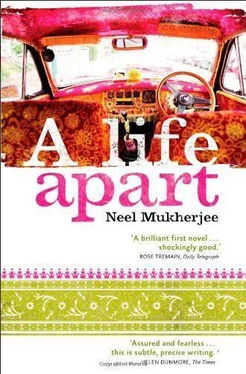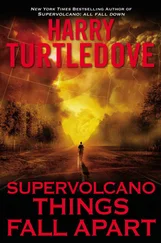The only established fact he had about his father’s jobs was their requirement of his long presence. The regularity of his mother waiting for his arrival home from work, first in the balcony, and then walking out to the bus stop, was a stable cornerstone of his boyhood. There were late nights; eleven or midnight was worrying, especially for a man who had suffered three cardiac arrests. Ritwik remembered a tired man with his head down walking so slowly along the edges of the road, beside the margins of the open drains, that he could have been looking resignedly for something he had lost along the same stretch of the street as he had walked on it in the opposite direction earlier on in the day. An old old old man, thrown in unregarded corners, already half in the shadow of death.
Ritwik had always been, as far back as he could remember, embarrassed by an old and sick father. Until the age of eleven, he had been taken to school — a forty-minute bus ride from Jadavpur to Park Circus — by one member of the family or another. Sometimes, his father took him there and insisted on seeing him inside, seeing him mingle with the other boys before the bell rang for morning assembly. He tried to dodge and parry the growing unease and sense of shame, which set upon him as soon as they neared the school building, by several clumsy strategies — walking faster to create a distance between them, insisting that his father went home once they had reached the main gate and not accompany him inside, see nobody’s father goes inside why should you why don’t you go back now I’ll be all right . The truth was that he didn’t want to be physically associated with this shabby old man. On a few occasions he had even gratuitously lied to his friends that the man with him was the driver dropping him off to school en route to taking his father to his swanky office.
Although Ritwik didn’t understand it then, part of the problem may have arisen from his unconscious reaction to the contrast between the class of boys — from well-heeled, middle-class to upper middle-class families — who attended that school and his own lot. Always a progressive man, his father had decided that the children’s education came first. ‘Without knowledge of the English language, you’re crippled,’ he used to say. If sacrifices had to be made for it, they would be made in some other household department. No compromise was ever to be made with the boys’ schooling: that was sacrosanct.
That, and books. Not in any superstitious way that was the general air in his uncles’ house, where he had to pick up books, paper, pens, pencils, erasers, pencil sharpeners — anything remotely connected to the world of study — and touch them to his forehead and chest, in the quick gesture of prayer, if he touched them accidentally with his feet. Books and related objects were sacred to Saraswati, the goddess of learning, and to bring feet anywhere near them was a mark of grave disrespect and would bring down a curse from her: she would never bless the offender with the gift of learning. Ritwik did all these things out of fear and, later, out of habit, but his father taught him a different sanctity of books.
It started when he was six. His father bought him a slim, big book, so thin it could be used for swatting mosquitoes with the sound and motion of a slap, a slipper book, as it was called. The title of the book was Maya of Mohenjo-daro and it told the story of Maya, also six, who lived in the ancient city of Mohenjo-daro and accompanied her father one morning to the Great Bath and from there to the Great Granary via the paved and clean streets of the town, which were laid out in such a way that the winds cleaned them every day. At the end of the day, both father and daughter made their way back home after he had bought her an orange woollen ball the colour of the setting sun. Happy, Maya returned home and was ready to go to bed when she noticed that her ball was like the sun, now sinking below the horizon in a blaze of orange and red fire.
Ritwik read it over and over again, and asked his father scores of questions: ‘Where is Mohenjo-daro?’, ‘What is an ancient city?’, ‘How old is ancient?’, ‘What is civilization?’, ‘Can I have a fluffy orange ball the colour of the sun?’ This last was, of course, the main thrust. In a book almost wholly illustrated in sepia and other shades of brown, the orange ball stood out like a lamp in the environing dark, almost ready to jump out of Maya’s dark hands into his. Every time he turned back to the page in which the bright ball first appeared it would seem to Ritwik that an added luminosity had stolen into his room. He stared and stared at the ball as his father told him about things he barely understood — Harappa, Indus Valley, ancient civilizations. In the book, Maya and her father were always smiling serenely. He didn’t know it was a strange longing that he felt each time he opened it.
Whenever a book was demanded by Ritwik, it arrived. His father went and ordered it in ‘Study’, the tiny bookshop in Jadavpur Central Market, paid in advance, and the book appeared, wrapped in crisp brown paper, in a week or two. Baba, I’d like to join the school quiz team I need General Knowledge books the four volumes of the Bournvita Quiz Book. Or, Baba, volumes five to seven of the Bournvita Book are out now can I have them soon. This was at a time when the landlord, Khokababu, visited the house weekly to demand the back payments on arrears and his father pretended to be too ill to go to work so that Khokababu could extend the deadline on sympathetic grounds. The household subsisted on rice and boiled potatoes for an entire week but there was no stinting with Ritwik’s books, no complaints about how expensive they were. His mother said, ‘You’re spoilt, you know. Before the words fall from your lips, your father goes out and does your bidding.’ He never understood whether she said this with disapproval or pride.
The Bournvita books were hardbound, the size of coffee-table books, with gold lettering on the spines. He guarded them with his life while his uncles looked at them with silent recrimination. On one occasion he heard Pratim saying to his mother, ‘All this talk of no money, no money, no money, rents unpaid, electricity bills unpaid, we’re constantly under fire from Jamaibabu, where’s all the money for these swish books coming from?’ Ritwik promptly hid them and only took them out when his uncles were out and when he was sure he could hide from the prying eyes of Dida.
And then one day the Collins Concise Encyclopaedia arrived , stout, big and substantial, in its bright red dust jacket, twelve hundred-odd pages of close, compact type on thin, tissue-like paper. It had black and white pictures as well: the bearded Louis Pasteur and Johannes Brahms; a severe yet benign Marie Curie; Keats reading an octavo volume with one hand on his forehead; a Chardin still-life with a vase of flowers; winged seeds that are dispersed by the wind; Byron in Greek headgear. It cost forty rupees and he had gone out with his father to get it from ‘Study’. He had beamed all the way there and back while his father cautioned him, ‘Don’t let anyone find out, especially Dida and your uncles. Keep it in a safe place, it costs a lot of money. .’ Ritwik plunged into it like a fish released from captivity into the waters again.
The excitement of the book never wore off; instead it surprised him with its myriad forms. First, there was the excitement of discovering an entry that was familiar to him. It gave him a little shiver of joy to see on the certainty of the printed page little areas of his mind précised into three or four close-knit lines. He looked up Tagore, Rabindranath; photosynthesis; mycology; Beethoven, Ludwig van; electrocardiogram with the thrill of seeing known things in unfamiliar and new settings, in the prestige of print. It endorsed his knowledge in some kind of way at the same time as it opened up new avenues in a proliferative dance. So gene led to DNA, DNA led to double-helix , from there to Watson and Crick through meiosis and mitosis, cell division to McClintock, Barbara. It was like the picture of nerve dendrons in his biology book, a web of paths and sub-paths, a familiar road suddenly leading him down unknown ones till he ended up himself as a wide-open space from the initial little cluster he had started off as.
Читать дальше












